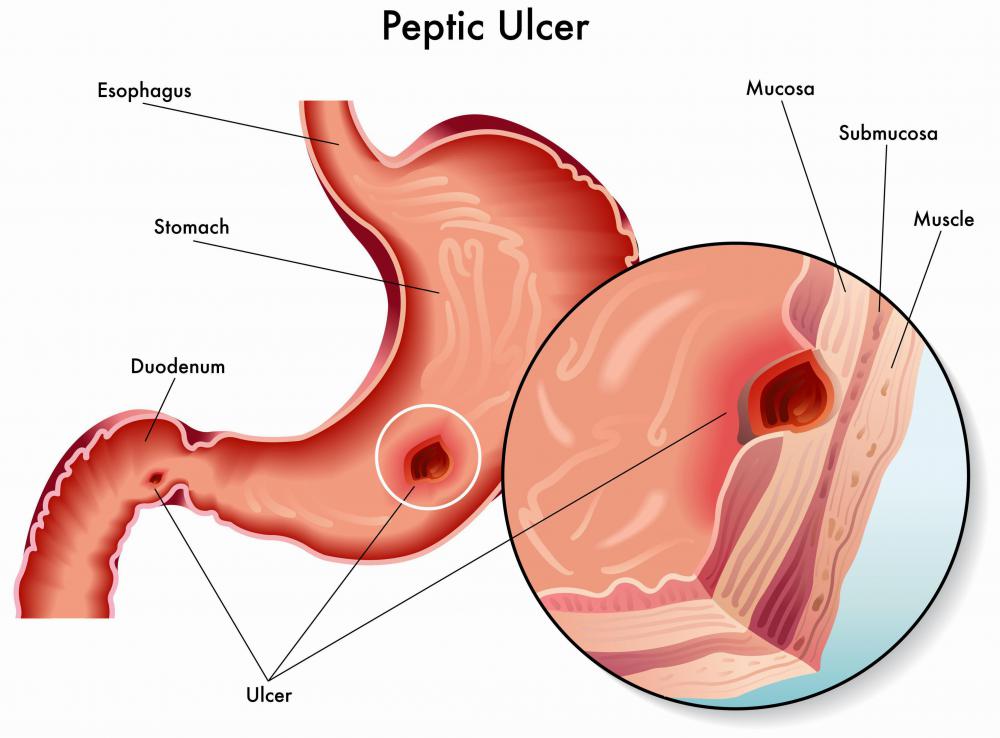At WiseGEEK, we're committed to delivering accurate, trustworthy information. Our expert-authored content is rigorously fact-checked and sourced from credible authorities. Discover how we uphold the highest standards in providing you with reliable knowledge.
What are Prostanoids?
Prostanoids are biologically active, pro-inflammatory compounds derived in the body from the chemical modification of three essential fatty acids. These compounds act as signaling substances, playing a key role in communication within the central nervous system and control of immune and inflammatory processes. The group of prostanoids consists of prostaglandins, prostacyclins, and thromboxanes. An enzyme, called cyclooxygenase (COX), causes the conversion of free fatty acids to prostanoids in a two-staged process. Many drugs, such as aspirin, decrease inflammation in the body by blocking the synthesis of prostanoid molecules through inhibition of cyclooxygenase.
The three 20-carbon fatty acids that form prostanoids are eicosapentaenoic acid, arachidonic acid, and dihomo-gamma-linolenic acid. While eicosapentaenoic acid is an omega-3 fatty acid, the other two are omega-6 fatty acids. Omega-6 products generate more inflammation than the omega-3 products, explaining the health benefits attributed to the omega-3 fatty acids. The precise balance of the two forms of fatty acids in the diet influences blood pressure, arthritis, cardiovascular function, and many other body processes or diseases that have been linked to inflammation in the body.

Prostanoids are responsible for causing many of the local symptoms of inflammation, including pain, redness, swelling, and warmth. Anti-prostanoid drugs target one of two isoforms of COX, either COX-1, which causes blood clotting, or COX-2, which causes pain and inflammation. Some drugs, however, mimic the action of the prostanoids to treat erectile dysfunction, glaucoma, stomach ulcers, and pulmonary hypertension. Additionally, obstetricians use two forms of prostanoid-simulating drugs to induce labor.

Cells do not store prostanoids in the body, but they synthesize them when they are required. Events that trigger the synthesis of prostanoids include injury to the cell, growth factors, or prostanoids released by a neighboring cell. A complex cascade culminates in the release of a free fatty acid from the cell membrane. COX then attaches two oxygen molecules to the fatty acid, forming a highly reactive, and potentially harmful, peroxide molecule. Release by the peroxide of one oxygen atom produces prostaglandin H (PGH), the precursor to all of the prostanoids.

The United States National Institutes of Health report a high level of evidence that modification of the diet to increase omega-3 fatty acids, found in fatty fish, improves outcomes in patients with high blood pressure, high triglyceride levels, and heart disease. There is also convincing evidence that omega-3 fatty acids may prevent rheumatoid arthritis and cardiovascular disease in susceptible patients. Furthermore, omega-3 fatty acids may alleviate symptoms of mental illness and psychiatric disorders. The mechanisms by which the omega-3 fatty acids protect tissues include displacement of omega-6 fatty acids and competition for the COX enzymes.
AS FEATURED ON:
AS FEATURED ON:















Discuss this Article
Post your comments